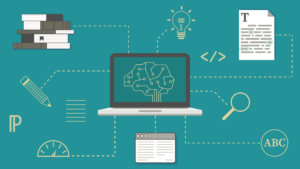Trainees bring a breath of fresh air to companies and often surprise with remarkable achievements. A notable example is Patrick Gustav Blaneck, a former MATSE trainee at the IT Center, who won the second place at the GermEval 2022 contest.
We as an employer think that it’s important to recognize and highlight the achievements of our employees. For that reason, we spoke with Patrick about his work, the experience he gained along the way, and his plans for the future.
Hi Patrick, can you briefly introduce yourself to our readership and tell us a little about your training?
Patrick: My name is Patrick Gustav Blaneck and I was a MATSE trainee at the IT Center until February 2023. I started my apprenticeship in 2020 and finished early by shortening it. During my apprenticeship I focused chiefly on Data Science, Machine Learning and Deep Learning, hence me being able to obtain the DataScienceMATSE specialization. In addition, I was the semester speaker in my MATSE year.
Congratulations on placing second in the 2022 GermEval competition! Can you tell us a bit about the framework of this competition and what exactly it was about?
Patrick: Thank you very much! The 2022 GermEval competition was about evaluating the text complexity of German texts. The readability of a text is an essential factor that influences the comprehension of readers. In the context of the competition, this readability was to be quantified accordingly. Participating teams should develop models that can automatically predict the complexity of text pieces on a scale of one to seven.
GermEval is a series of shared tasks that take place as part of KONVENS. This is an annual scientific conference on topics in computational linguistics and language technology.
During your work, you must have received support. Who assisted you and how was the work divided up?
Patrick: The work was a team effort and everyone contributed their own skills and experience. Besides me, the team consisted of Prof. Stephan Bialonski (Professor for Data Science at FH Aachen), Niklas Grieger (M. Sc. PhD student with Prof. Bialonski) and Tobias Bornheim (B. Sc. Master student at FH Aachen). Prof. Bialonski was our expert for scientific methods and publications and was always available for advice. Prof. Bialonski, Niklas and Tobias already had experience with the GermEval competition the previous year and could provide valuable insights and advice.
We tried different approaches during the course of the competition and divided their implementation among the team. I was responsible for evaluating and implementing ensembling methods of different models. Tobias Bornheim tried out other approaches, such as incorporating classical readability metrics. Niklas Grieger always had a critical eye to point out possible improvements. Overall, it was a great team effort where everyone gave their best. I am grateful for my colleagues’ support and the opportunity to participate in this exciting project.
Can you give us a brief insight into your work? What was it all about?
Patrick: Gladly. As already described, the project was about text complexity evaluation of German texts. In doing so, I investigated and compared different model architectures for predicting text complexity. These included BERT (Google), GPT-2 (OpenAI), and RoBERTa (Facebook and Meta, respectively). My goal was to find out which model is best suited to evaluate text complexity in German.
Additionally, I investigated the evaluation of Ensembling. Here, the predictions of several models and model families were combined to achieve better results. I tested and evaluated different approaches to see if they can indeed lead to better prediction results. You can find the paper on my work on the ACL Anthology website.
Was the paper presented at the conference? How did you prepare for it? Were there any particular challenges you faced?
Patrick: Yes, the work was presented at KONVENS. The talk was given by Niklas Grieger and me at the University of Potsdam in September 2022 in front of an expert audience. The preparation was achieved together with the team and a joint concept was developed. Special attention was paid to presenting the methodology of the work as clearly and understandably as possible.
Preparing for the conference and the talk presented me with some challenges. It was my first participation in a scientific conference and also my first professional lecture. The nervousness was therefore great, in addition to the presentation having to be given in English, which proved to be a challenge. Nevertheless, we were able to give the talk successfully and the feedback was very positive.
In the meantime, you have successfully completed your training. What are you doing now and what are your plans for the future?
Patrick: Since my successful graduation, I have been happily continuing my work as a software developer at the IT Center on a part-time basis. Currently, I am also doing my Master’s degree in “Applied Mathematics and Computer Science” at the FH Aachen. Together with Prof. Bialonski I continue to work on Deep Learning and Natural Language Processing (NLP). Furthermore, I am involved in the youth and trainee representation (JAV) of RWTH Aachen University.
My plans for the future include to continue my work at the IT Center successfully and to develop further in my field, especially in Deep Learning and NLP. I will also strive to continue to make a positive impact on MATSE training, for example by getting involved in the JAV, maintaining contact with other trainees and apprenticeship years, maintaining communication with the MATSE group, and sharing my experience and knowledge as needed.
____________________________________________________________________________________________________
We would like to thank Patrick for the insights into his exciting work and wish him all the best for his professional future.
Responsible for the content of this article are Stéphanie Bauens, Patrick Blaneck und Jelena Ćulum.





